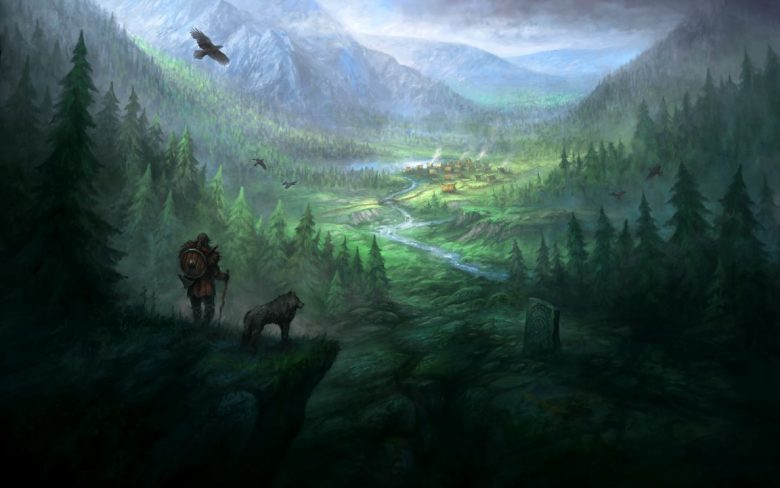The age of heroes is dead, and the bridge to glory is broken—Bifrost fell long ago, cutting it off from the other realms.
The world is lost in an age of war, of dark wilderness and lost empires sunk beneath
the waves. Only magic and the warmth of hope keep lights aglow when dread
things prowl and the priestly wardings shake, bent by hideous otherworldly rage.
In this dark time, heroes must arise to claim the World Runes of Midgard and restore
the Runes to their respected standing stones to restore the weakened ley lines. New heroes must lead a return to glory!
A Flat World
The flat world of Midgard floats in a vast space of living stars. The heavens are
accessible to great heroes who dare to visit them, by climbing a tower into the
heavens or sailing to enormous heights on Void dragon wings. A great serpent
surrounds the world, or so claim those few travelers who have been to the edge
of the world. What lives underneath? No one knows for sure. Midgard is not a
modern world dressed up in a few medieval bits of armor and weaponry. Midgard
makes the mythic real, with a world to explore from edge to edge.
Elemental Dragon Lords
The dragons of Midgard correlate to the elements rather than to colors and metals (though all the traditional dragons are present). They obey an urge to power and rulership, and they exercise that rule through an entire empire that carries their name. All dragons seek to rule their provinces and to carve out power, the better to amass treasures. As their willing servants, dragonborn, kobolds, and drakes are rewarded with lands and wealth of their own. The dragons of Midgard have no interest in sitting in a lonely cave, counting coins. Their greed makes them ambitious, and that ambition makes them extremely dangerous. They do not wait for their fate to visit them, but instead they climb aloft and survey the land, knowing it is all theirs for the taking if their claws are strong enough to hold it.
The Gods
The Midgard pantheon has needs, and the urge to meddle.
The gods dispense spells and miracles to their faithful,
but they make clear demands of their worshippers and
priesthoods. The gods also argue, sire children to rule
kingdoms, and foment wars and feuds. Divine murder and
enslavement are possible. Their
hatreds and rivalries spill out from the heavens and into the
mortal streets and kingdoms.
Every deity has distinct goals and desires, and they
specify what they expect of their followers. The realms of the gods can be seen as planets in the night sky.
The Ley Lines
The land is alive with ley line magic (the source of all magic), and some know how
to harness that power for spellcasting and magical travel.
The elven gods used the magic of ley lines
to create and sustain the shadow roads, making it possible to connect
a far-flung empire. When the elven gods retreated from the
world, their roads remained, and humans
learned to tap into the ley lines that sustain this
magic. Player characters and villains alike can use these
wellsprings of power, which flow invisibly everywhere—
though the most powerful ley line conjunctions are
warded or guarded, used as the foundation of great
fortresses or thriving cities. In Midgard, you can increase
the level of magical power to unheard-of levels using the ley lines.
The Tale of Creation
Many who worship dragons believe that Aurelion Sol, the father of all dragons, created the stars and formed the heavens. It is said he strung mountains together and carved it into the world of Midgard. It is then said that the dragons taught the mortals of Midgard how to use magic. Others believe that Ymir, the father of all giants, was slain by the gods and Midgard was fashioned from his corpse. Soon after creatures and life would sprout from his body and the mortals of Midgard were born. The dwarves believe Midgard always existed and that they were born from the stone of Midgard, while the other races and gods merely stumbled upon Midgard and inhabited it. Much of the elves beliefs and history was lost to time when their gods disappeared, with only some history within ruins of their ancient temples remaining.


Comments